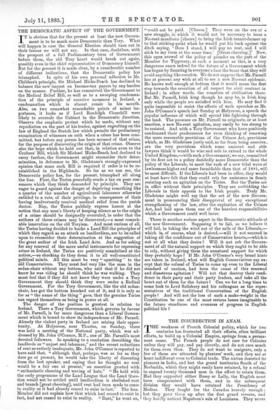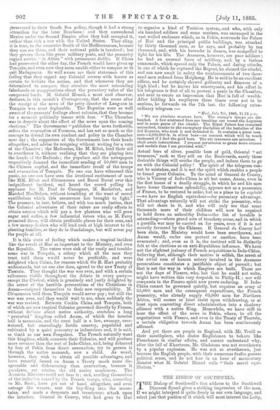THE INSURRECTION IN ANAM.
gersevered in their South Sea policy, though it had a strong attraction for the later Bourbons ; and they surrendered Mexico under the Second Empire after they had occupied it, rather than risk a war with the United States. They cling, it is true, to the countries South of the Mediterranean, because they can see them, and their national pride is involved ; but they govern them like great military posts, and the peasantry regard service in Africa" with permanent dislike. If China had persevered the other day, the French would have given up Tonquin, and even now they seem unable either to conquer or to quit Madagascar. So well aware are their statesmen of this feeling that they regard any Colonial reverse with horror as certain to irritate the nation, and that whenever they are determined to conquer, they circulate the most astounding falsehoods or exaggerations about the pecuniary value of the conquered lands. M. Gabriel Monod, a most cool observer, declares, in this month's Contemporary, that the scene after the receipt of the news of the petty disaster of Lang-son in Tonquin was most deplorable. The Deputies were so well aware of the peasants' feelings about colonies, that they became for a moment politically insane with fear. "The Chamber was in despair about the effect of the news upon the coming elections." The Government "publishes the news forthwith, orders the evacuation of Formosa, and has not so much as the courage to defend its own conduct and policy in the Chamber next day ; the supporters of the Government lose their heads altogether, and advise its resigning without waiting for a vote of the Chamber ; the Moderates, like M. Ribot, lend their aid to overthrow it, without realising that they are playing into the hands cf the Radicals ; the populace and the newspapers respectively demand the immediate sending of 50,000 men to the Chinese capital, and the immediate recall of the troops and evacuation of Tonquin. No one can have witnessed this panic no one can have seen the irrational excitement of men like it1M. Ribot and Clemenceau and Raoul Duval over this insignificant incident, and heard the crowd yelling its applause for M. Paul de Cassagnac, M. Rochefort, and Marshal MacMahon, without trembling at the want of moral equilibrium which this occurrence has brought to light." The peasants, in fact, believe, and with too much justice, that the Colonial adventures of their rulers are really efforts to obtain estates which will pay a few planters who will grow sugar and coffee, a few influential voters who, as M. Ferry promised them, will obtain profitable places for their sons, and a few money-dealers who will lend cash at high interest to the planting families, as they do in Guadaloupe, but will never pay the people at all.
It is this state of feeling which makes a tragical incident like the revolt at Hue so important to the Ministry, and even the Republic. The voters were sick of the costly and trouble- some war in Tonquin, a colony which all the men they trust told them would never be profitable, and were delighted when China, for reasons which Sir R. Hart probably understands, but no one else does, agreed to the new Treaty of Tientsin. They thought the war was over, and with a certain sullenness visible throughout the debate in every party— except the Clerical, which is genuinely and justly delighted by the arrest of the horrible persecutions of the Christians in Anam—resigned themselves to their new responsibility. M. Clemeneeau told them Tonquin would never pay ; but still the war was over, and they would wait to see, when suddenly the war was revived. Between Cochin China and Tonquin, both of which are now tropical Colonies governed directly by France, without fictions about native authority, stretches a long "protected" kingdom called Anam, of which the interior half is mountain, and the coast half is a low, swampy, over- watered, but exceedingly fertile country, populated and cultivated by a quiet peasantry as industrious and, it is said, as timid as our own Bengalees. The French naturally want this kingdom, which connects their Colonies, and will produce more revenue than the rest of Indo-China, and, being debarred by fear of Pekin from direct annexation, try to govern it through the native monarch, now a child. As usual, however, they wish to obtain all possible advantages, and have recently forced on Anam a Treaty much more dis- agreeable and dishonouring than annexation, because it paralyses, yet retains, the old native machinery. The Aaam:te Ministers could not bear it ; and, availing themselves of the irritation caused by the French troops, who, according to Mr. Scott, have got out of hand altogether, and even outrage the women, sent the boy-King into the moun- tains, and made a desperate and treacherous attack upon the invaders. General de Courcy, who had gone to Hue to organise a kind of Tunisian system, and who, with only six hundred soldiers and some marines, was encamped in the vast walled enclosure which, as in Pekin, surrounds the Palace of Hue and the principal public buildings, was attacked by thirty thousand men, as he says, and probably by ten thousand, and, with his barracks in flames, was compelled to fight for his life. The Anamese, however, are poor soldiers ; he had an unusual force of artillery, and, by a furious cannonade, which spared only the Palace, and daring attacks, in one of which he captured the Regent, he cleared the citadel, and can now await in safety the reinforcements of two thou- sand men ordered from Haiphong. He is said to be an excellent officer, and he certainly showed gallantry and firmness of a high kind ; but he knows his countrymen, and his effort in his telegrams is first of all to prevent a panic in the Chamber, and next to create an impression that Hue is full of wealth. After bidding his employers three times over not to be anxious, he forwards on the 7th inst. the following extra- ordinary telegram :—
"Hue, July 7th, 1885, 11.55 p.m. "We are absolute masters here. The enemy's troops are dis- banded. A few scattered fires are breaking out round the Legation and in some parts of the citadel. The Royal Palace has remained untouched, thanks to the exemplary discipline of the battalion of the 3rd Zouaves, who took it and defended it It contains a great trea- sure-5,000,000 fr. in silver bars—an amount which will be much increased if I find the gold bars. The art treasures are priceless. I shall await instructions. I request permission to grant more crosses and medals than I am provided with."
Actual bars of silver, possible bars of gold, Oriental "art treasures," such as they sell on tbe Boulevards, surely these desirable things will soothe the people, and induce them to go on with the Colonial policy! The spirit of the telegram can- not be mistaken, and it is not the spirit which enables a people to found great Colonies. To the mind of General de Conroy, who is Viceroy of Indo-China in all but name, Anam, even in the first hours of a deadly struggle, in which he and his men have borne themselves splendidly, appears not as a possession of France, to be restored to order, but as a place to be exp/oiti —we have no English equivalent—for pecuniary advantage. That advantage naturally will not strike the peasantry, who will not share in it, and who will only see that some thousands more of their children will now be required to hold down an unhealthy Delta—the list of invalids is astounding—where grand acts of treachery occur, and in which a guerilla war may be carried on for years, even if it is not secretly favoured by the Chinese. If General de Courcy had been slain, the Ministry would have been overthrown, and Anam would, under one pretext or another, have been evacuated ; and, even as it is, the incident will be distinctly felt at the elections as an anti-Republican influence. We have not the slightest jealousy of French acquisitions in Indo-China, believing that, although their motive is selfish, the arrest of the awful sum of human misery involved in the Anamese persecutions constitutes a justifiable object of pursuit ; but that is not the way in which Empires are built. These are not the days of Pizarro, who, but that he could not write, might have written this very despatch to Philip IL; nor will conquests in the Pizarro spirit now prove enduring. If Indo- China cannot be governed quietly, but requires an army of 35,000 men and the consequent expenditure, the French peasantry, who already supply 65,000 men for Northern Africa, will sooner or later insist upon withdrawing, or at least upon converting direct administration into a shadowy alliance with a native King. Meanwhile, we have still to hear the effect of the news in Pekin, where, in all the negotiations with France, and even in the Treaty of Tientsin, a certain obligation towards Anam has been continuously affirmed.
And yet there are people in England, with Mr. Trail as their mouthpiece, who desire Englishmen to behave like Frenchmen in similar affairs, and cannot understand why, after the fall of Khartoum, Mr. Gladstone was not overthrown by a popular explosion. He was not so overthrown, just because the English people, with their numerous faults, possess political sense, and do not lose in an hour of momentary disaster what M. Gabriel Monad calls "their moral equi- librium."



































 Previous page
Previous page